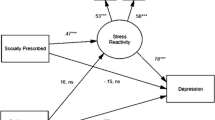Abstract
This study investigated relationships between perfectionism and psychological distress in a sample of first year college students further divided between those who were enrolled in an honors curriculum (n = 60) and those who were not (n = 53). Participants completed the Perfectionism Cognitions Inventory (PCI), the Frost Multidimensional Perfectionism Scale (MPS), and the profile of mood states (POMS) at the start of the semester and then again 6 weeks later. Results revealed that one dimension of the MPS—maladaptive evaluative concerns (EC)—was positively associated with tension-anxiety and depression-dejection scores, while a second factor—pure personal standards (PS)—was negatively related to distress after extraneous variance was removed. Perfectionism cognitions as measured by the PCI either fully or partially mediated most relationships. Honors students reported higher personal standards than did controls, a difference that was consistent at 6-week follow-up.
Similar content being viewed by others
References
Barry, E. S., Naus, M. J., & Rehm, L. P. (2006). Depression, implicit memory, and self: A revised memory model of emotion. Clinical Psychology Review, 26, 719–745.
Chang, E. C., & Rand, K. L. (2000). Perfectionism as a predictor of subsequent adjustment: Evidence for a specific diathesis-stress mechanism among college students. Journal of Counseling Psychology, 47, 129–137.
Chang, E. C., Sanna, L. J., Chang, R., & Bodem, M. R. (2008). A Preliminary look at loneliness as a moderator of the link between perfectionism and depressive and anxious symptoms in college students: Does being lonely make perfectionistic strivings more distressing? Behaviour Research and Therapy, 46, 877–886.
DiBartolo, P. M., Frost, R. O., Chang, P., LaSota, M., & Grills, A. E. (2004). Shedding light on the relationship between personal standards and psychopathology: The case for contingent self-worth. Journal of Rational-Emotive and Cognitive Behavior Therapy, 22, 241–254.
DiBartolo, P. M., Li, C. Y., & Frost, R. O. (2008). How do the dimensions of perfectionism relate to mental health? Cognitive Therapy and Research, 32, 401–417.
Dunkley, D. M., Blankstein, K. R., Masheb, R. M., & Grilo, C. M. (2006). Personal standards and evaluative concerns dimensions of “clinical” perfection: A reply to Shafran et al. (2002, 2003) and Hewitt et al. (2003). Behavior Research and Therapy, 44, 63–84.
Enns, M. W., & Cox, B. J. (2005). Perfectionism, stressful life events, and the 1-year outcome of depression. Cognitive Therapy and Research, 29, 541–553.
Flett, G. L., Hewitt, P. L., Blankstein, K. R., & Gray, L. (1998). Psychological distress and the frequency of perfectionistic thinking. Journal of Personality and Social Psychology, 75, 1363–1381.
Flett, G. L., Hewitt, P. L., Whelan, T., & Martin, T. R. (2007). The perfectionism cognitions inventory: Psychometric properties and associations with distress and deficits in cognitive self-management. Journal of Rational-Emotive & Cognitive-Behavior Therapy, 25, 255–277.
Flett, G. L., Madorsky, D., Hewitt, P. L., & Heisel, M. J. (2002). Perfectionism cognitions, rumination, and psychological distress. Journal of Rational-Emotive & Cognitive-Behavior Therapy, 20, 33–47.
Frost, R. O., Heimberg, R. G., Holt, C. S., Mattia, J. I., & Neubauer, A. L. (1993). A comparison of two measures of perfectionism. Personality and Individual Differences, 14, 119–126.
Frost, R. O., Marten, P., Lahart, C., & Rosenblate, R. (1990). The dimensions of perfectionism. Cognitive Therapy and Research, 14, 449–468.
Hewitt, P. L., & Flett, G. L. (1991). Perfectionism in the self and social contexts: Conceptualization, assessment, and association with psychopathology. Journal of Personality and Social Psychology, 60, 456–470.
Hewitt, P. L., & Flett, G. L. (1993). Dimensions of perfectionism, daily stress, and depression: A test of the specific vulnerability hypothesis. Journal of Abnormal Psychology, 102, 58–65.
Hewitt, P. L., Flett, G. L., & Ediger, E. (1996). Perfectionism and depression: Longitudinal assessment of a specific vulnerability hypothesis. Journal of Abnormal Psychology, 105, 276–280.
Hewitt, P. L., Flett, G. L., Norton, G. R., & Flynn, C. (1998). Dimensions of perfectionism and chronic symptoms of unipolar and bipolar depression. Canadian Journal of Behavioural Science, 30, 234–242.
Hewitt, P. L., & Genest, M. (1990). The ideal-self: Schematic processing of perfectionistic content in dysphoric university students. Journal of Personality and Social Psychology, 59, 802–808.
Keith, T. Z. (2005). Multiple regression and beyond. Boston, MA: Allyn & Bacon.
Lynd-Stevenson, R. M., & Hearne, C. M. (1999). Perfectionism and depressive affect: The pros and cons of being a perfectionist. Personality and Individual Differences, 26, 549–562.
McNair, D. M., Lorr, M., & Droppleman, L. F. (1971). Manual for the profile of mood states. San Diego, CA: Educational and Industrial Testing Services.
Preacher, K. J., & Hayes, A. F. (2008). Asymptotic and resampling strategies for assessing and comparing indirect effects in multiple mediator models. Behavior Research Methods, 40, 879–891.
Pryor, J. H., Hurtado, S., DeAngelo, L., Palucki, B. L., & Tran, S. (2010). The American freshman: National norms fall 2010. Los Angeles: Higher Education Research Institute, UCLA.
Rice, K. G., Ashby, J. S., & Slaney, R. B. (1998). Self-esteem as a mediator between perfectionism and depression: A structural equation analysis. Journal of Counseling Psychology, 45, 304–314.
Rice, K. G., Leever, B. A., Christopher, J., & Porter, D. (2006). Perfectionism, stress, and social (dis)connection: A short-term study of hopelessness, depression, and academic adjustment among honors students. Journal of Counseling Psychology, 53(4), 524–534.
Shafran, R., Cooper, Z., & Fairburn, C. G. (2002). Clinical perfectionism: A cognitive behavioural analysis. Behaviour Research and Therapy, 40, 773–791.
Slaney, R. B., Ashby, J. S., & Trippi, J. (1995). Perfectionism: Its measurement and career relevance. Journal of Career Assessment, 3, 279–297.
Slaney, R. B., Rice, K. G., Mobley, M., Trippi, J., & Ashby, J. S. (2001). The Revised Almost Perfect Scale. Measurement and Evaluation in Counseling and Development, 34, 130–145.
Stoeber, J., Kobori, O., & Tanno, Y. (2010). The Multidimensional Perfectionism Cognitions Inventory-English (MPCI-E): Reliability, validity, and relationships with positive and negative affect. Journal of Personality Assessment, 92(1), 16–25.
Author information
Authors and Affiliations
Corresponding author
Rights and permissions
About this article
Cite this article
Wimberley, T.E., Stasio, M.J. Perfectionistic Thoughts, Personal Standards, and Evaluative Concerns: Further Investigating Relationships to Psychological Distress. Cogn Ther Res 37, 277–283 (2013). https://doi.org/10.1007/s10608-012-9462-7
Published:
Issue Date:
DOI: https://doi.org/10.1007/s10608-012-9462-7




